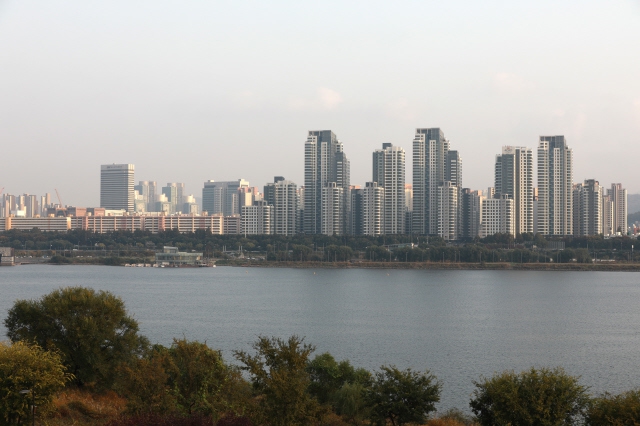 |
|
A Seoul apartment complex (Hankyoreh archives)
|
Rich people identity real estate as the greatest contributor to their wealth
Despite adjustments taking place in the real estate market amid economic slowdowns at home and overseas, many of South Korea’s wealthy have no plans to reduce the percentage of their assets represented by real estate, a study shows. Many were also found to regard real estate as having made the largest contribution to their current level of wealth. According to a 2019 report on South Korea’s wealthy published on Jan. 28 by KEB Hana Bank and the Hana Institute of Finance, 84% of South Korea’s wealthy population predicted the real estate economy would suffer stagnation or slump conditions over the next five years. The results show an even higher level of pessimism than the previous year’s stagnation/slump forecast of 78%. On average, real estate was found to account for the largest portion of their total assets at 50%, up from 47% the year before. The KEB Hana Bank and Hana Institute of Finance report was based on findings from two months of surveys begun in Oct. 2018 with 992 customers of the Hana Bank PB Center (an asset management organization) with financial assets of one billion won (US$895,820) or more. Despite their negative outlook on the real estate economy, the wealthy survey participants generally adopted a “wait and see” approach, opting to keep their current asset distribution untouched. Forty-six percent said they planned to maintain their current distribution of assets, while 18% said they planned to reduce real estate and increase financial assets and 13% said they planned to increase real estate and reduce financial assets. In all, some 59% announced plans to maintain their proportion of real estate assets, which currently average around 50% of all assets. The decision appears to stem from the respondents’ belief that real estate has made the biggest contribution to their current asset holdings. When asked which form of investment or income had contributed most to their current wealth, respondents named real estate investment most frequently (27%), followed by business income (20%), earned income (19%), financial asset investment (19%), and gifts and donations from parents (15%). At 44%, real estate was also the form adopted by the most respondents when deciding on gift/inheritance plans for their own offspring; next in line were cash/deposits (31%) and stocks/bonds/funds (9%). The percentage of respondents favoring real estate as a way of bequeathing wealth has risen yearly from 39.7% in 2016 to over 40% recently. “Despite the poor state of the real estate economy, there’s an increasingly clear trend of using real estate for gifts and inheritance, as it is seen as providing greater stability than financial products with its rental earnings and is expected to grow in future value,” explained Hana Institute of Finance senior research fellow Lee Gyeong-jin. By Jung Se-ra, staff reporter Please direct comments or questions to [english@hani.co.kr]






